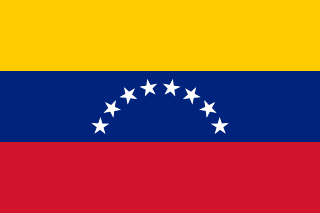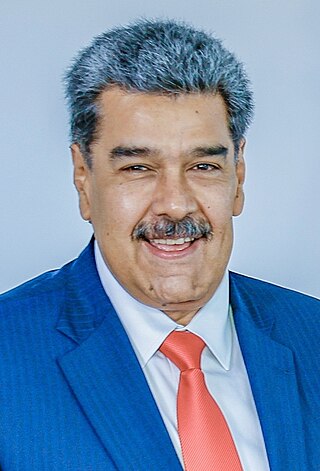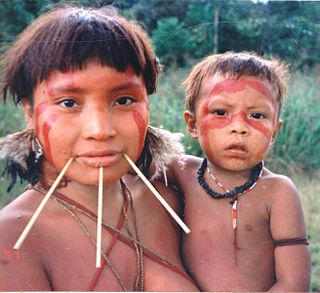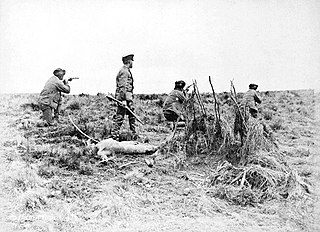Related Research Articles

Venezuela, officially the Bolivarian Republic of Venezuela, is a country on the northern coast of South America, consisting of a continental landmass and many islands and islets in the Caribbean Sea. It comprises an area of 916,445 km2 (353,841 sq mi), and its population was estimated at 29 million in 2022. The capital and largest urban agglomeration is the city of Caracas. The continental territory is bordered on the north by the Caribbean Sea and the Atlantic Ocean, on the west by Colombia, Brazil on the south, Trinidad and Tobago to the north-east and on the east by Guyana. Venezuela is a presidential republic consisting of 23 states, the Capital District and federal dependencies covering Venezuela's offshore islands. Venezuela is among the most urbanized countries in Latin America; the vast majority of Venezuelans live in the cities of the north and in the capital.

The foreign relations of Venezuela had since the early twentieth century been particularly strong with the United States. However, since the election of Hugo Chávez as President of Venezuela in 1998, Venezuela's foreign policy differed substantially from that of previous Venezuelan governments. This change in foreign policy direction continues under the current president Nicolás Maduro.

Elections in Venezuela are held at a national level for the President of Venezuela as head of state and head of government, and for a unicameral legislature. The President of Venezuela is elected for a six-year term by direct election plurality voting, and is eligible for re-election. The National Assembly (Asamblea Nacional) has 277 members (diputados), elected for five-year terms using a mixed-member majoritarian representation system. Elections also take place at state level and local level.

Davi Kopenawa Yanomami, name also written Davi Kobenawä Yanomamö, is a Yanomami shaman and Portuguese-speaking spokesperson for the Yanomami People in Brazil. He became known for his advocacy regarding tribal issues and Amazon rainforest conservation when the tribal rights organization Survival International invited him to accept the Right Livelihood Award on its behalf in 1989. Since then, Kopenawa has traveled around the globe to speak on the catastrophic consequences of the invasion of Yanomami land and the destruction of the Amazon rainforest. As part of his advocacy for the Yanomami people and against extractivist exploitation, Kopenawa has co-authored and contributed to multiple published books that have been translated to multiple languages.
Chavismo, also known in English as Chavism or Chavezism, is a left-wing populist political ideology based on the ideas, programs and government style associated with the Venezuelan President between 1999 and 2013 Hugo Chávez that combines elements of democratic socialism, socialist patriotism, Bolivarianism, and Latin American integration. People who supported Hugo Chávez and Chavismo are known as Chavistas.

Nicolás Maduro Moros is a Venezuelan politician serving as the 53rd president of Venezuela since 2013. Previously, he was the 24th vice president of Venezuela from 2012 to 2013, the minister of foreign affairs from 2006 to 2012, and the 3rd president of the National Assembly of Venezuela from 2005 to 2006.
The Haximu massacre, also known as the Yanomami massacre, was an armed conflict in Brazil in 1993. The conflict occurred just outside Haximu, Brazil, near the Venezuelan border, beginning in mid-June or July of 1993. Sixteen Yanomami people were killed by a group of garimpeiros, or gold miners who mine the land illegally.

The Yanomami, also spelled Yąnomamö or Yanomama, are a group of approximately 35,000 indigenous people who live in some 200–250 villages in the Amazon rainforest on the border between Venezuela and Brazil.

The record of human rights in Venezuela has been criticized by human rights organizations such as Human Rights Watch and Amnesty International. Concerns include attacks against journalists, political persecution, harassment of human rights defenders, poor prison conditions, torture, extrajudicial executions by death squads, and forced disappearances.

The Selk'nam genocide was the systematic extermination of the Selk'nam people, one of the four indigenous peoples of Tierra del Fuego archipelago, in the late 19th and early 20th centuries. Historians estimate that the genocide spanned a period of between ten and twenty years, and resulted in the decline of the Selk'nam population from approximately 4,000 people during the 1880s to a few hundred by the early 1900s.
The genocide of indigenous peoples in Brazil began with the Portuguese colonization of the Americas, when Pedro Álvares Cabral made landfall in what is now the country of Brazil in 1500. This started the process that led to the depopulation of the indigenous peoples in Brazil, because of disease and violent treatment by Portuguese settlers, and their gradual replacement with colonists from Europe and enslaved peoples from Africa. This process has been described as a genocide, and continues into the modern era with the ongoing destruction of indigenous peoples of the Amazonian region.

The Venezuelan refugee crisis, the largest recorded refugee crisis in the Americas, refers to the emigration of millions of Venezuelans from their native country during the presidencies of Hugo Chávez and Nicolás Maduro since the Bolivarian Revolution. The revolution was an attempt by Chávez and later Maduro to establish a cultural and political hegemony, which culminated in the crisis in Venezuela. The resulting refugee crisis has been compared to those faced by Cuban exiles, Syrian refugees and those affected by the European migrant crisis. The Bolivarian government has denied any migratory crisis, stating that the United Nations and others are attempting to justify foreign intervention within Venezuela.

Fray Pedro Simón was a Spanish franciscan friar, professor and chronicler of the indigenous peoples of modern-day Colombia and Venezuela, at the time forming the New Kingdom of Granada. Pedro Simón is one of the most important Muisca scholars forming the basis for later scholars such as Lucas Fernández de Piedrahita, Alexander von Humboldt, Javier Ocampo López and many others.

The Pemon conflict is an ongoing conflict which is a part of the wider Crisis in Venezuela. The conflict is centered around mining disputes between the Maduro government, the Pemon nation and armed irregular groups. The Pemon nation is divided by the border between Venezuela and Brazil, resulting in Pemon refugees regularly crossing the border into Brazil for safety and medical care. The conflict is centred on disputes over mining in the Orinoco Mining Arc, a 112,000 km2 area of the Amazon Rainforest rich in gold, diamonds, coltan, and uranium, which are also home to the Pemon people.

The Massacre of Salsipuedes, also known as the Slaughter of Salsipuedes, was a genocidal attack carried out on 11 April 1831 by the Uruguayan Army, led by Fructuoso Rivera, as the culmination of the state's efforts to eradicate the Charrúa from Uruguay.

San Francisco de Yuruaní, also known as Kumarakapay, is a town in Venezuela. The majority of people there are members of the indigenous Pemon people.

On 22 February 2019, during the shipping of humanitarian aid to Venezuela, the Venezuelan Army sent troops to the Brazilian border, driving through Kumarakapay in the territory of the Pemon tribe. Local indigenous protesters and leaders in Kumarakapay attempted to halt advancing personnel carriers by building a road blockade, managing to detain several soldiers. The Venezuelan soldiers fired at them, killing at least eleven Pemon in total and injuring around 12 more.
During the presidency of Jair Bolsonaro (2019–2023), a series of mass deaths, famine, forced displacements and other major human rights violations took place in the Brazilian Yanomami Indigenous Territory. Such events reportedly started or were aggravated from 2019 on as a consequence of rampant exploitation of natural resources by individuals and companies with state approval, and have been frequently said to constitute a genocide against the Yanomami people. It is part of the larger ongoing genocide of Indigenous peoples in Brazil.
Rosa Verónica Petit De Castillo is a Venezuelan politician, currently an alternate deputy of the National Assembly for the Amazonas state.
References
- 1 2 "Venezuela no festeja el "genocidio" sino la resistencia indígena". THE OBJECTIVE (in Spanish). 2016-10-12. Archived from the original on 2024-06-28. Retrieved 2024-07-18.
- ↑ "30 años después, la masacre de Haximu recuerda a Brasil el conflicto sobre la protección de indígenas". Folha de S. Paulo (in Spanish). 2023-08-22. Archived from the original on 2023-11-19. Retrieved 2024-07-18.
- ↑ "El hombre que fusiló al Diablo". El Universal (in Spanish). 2018-10-24.
- ↑ Bernucci, Leopoldo M. Un paraíso sospechoso: La vorágine de José Eustasio Rivera, novela e historia (in Spanish).
- 1 2 3 4 Ferguson, R. Brian, Yanomami Warfare (USA: School of American Research, 1995), 375.
- 1 2 Tierney, Patrick, Darkness in El Dorado (New York: W.W Norton & Company, 2000), 195.
- ↑ "Conquista". Fundación Empresas Polar (in Spanish). Diccionario de Historia de Venezuela. Archived from the original on 2023-04-04. Retrieved 2024-07-18.
- ↑ Galeano, Eduardo. Las venas abiertas de América Latina (PDF) (in Spanish). p. 218. Archived (PDF) from the original on 2024-06-13. Retrieved 2024-07-18.
- ↑ Churchill, Ward (2000). Israel W. Charny (ed.). Encyclopedia of Genocide . ABC-CLIO. p. 433. ISBN 978-0874369281.
- ↑ "La Entrevista - Luisa Ortega Díaz: "hay un genocidio en Venezuela"". France 24 (in Spanish). 2018-08-24.
- ↑ "1520 - Cronología de historia de Venezuela" (in Spanish). Diccionario de Historia de Venezuela. Archived from the original on 2024-02-02. Retrieved 2024-07-18.
- ↑ "España celebró la conquista de América: hubo abucheos al presidente y aplausos al Rey". Agencia IP (in Spanish). 2021-10-12. Archived from the original on 2024-07-06. Retrieved 2024-07-18.
- ↑ "Venezuela espera la disculpa de España por el genocidio de 300 años contra los pueblos indígenas". TRT Español (in Spanish). 13 October 2021. Archived from the original on 28 June 2024. Retrieved 18 July 2024.
- ↑ "Venezuela instala comisión para "exponer la verdad del colonialismo" europeo". Swissinfo (in Spanish). 2022-01-25. Archived from the original on 2024-06-28. Retrieved 2024-07-18.